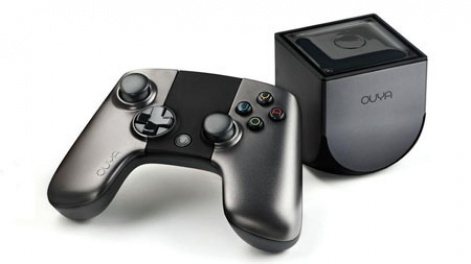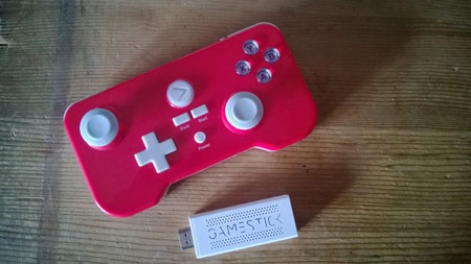Fraser MacInnes is a mobile games industry professional who cut his teeth writing for Pocket Gamer.
He's now working for Danke Games, a gaming start-up based in the heart of the Black Forest in Germany.
I championed them, but I was wrong.
I desperately wanted to the GameStick and the Ouya to be disruptive, paradigm-shattering successes, but they won't be claiming any significant living room market share any time soon.
The idea is still a good one - all the best bits of the mobile gaming industry transposed onto the living room market. Cheap hardware, cheap games, open development tools - just like mobile, right?
Wrong! The part that's different on mobile is cheap hardware.
The sort of Apple and Android devices that the vast majority of mobile gaming takes place on are not cheap. In fact they are luxury devices, hewn from glass, aluminum and polycarbonized aspiration.
You get what you pay for...
I'll be charitable and say merely that neither the GameStick or the Ouya are imbued with one molecule of that all-important lust factor that the juiciest tech has to have.
I hate to be so unkind to the hard-working people who clearly lavished passion and dedication on bringing the Ouya and the GameStick to market, because it's clear that given the budgets behind each of these devices, it's a near miracle the things even launched.

I haven't done my usual three second wiki check but I'd wager that historically, price has almost always been the most important competition point to win on in gaining a commanding share of the home console market.
If that highly speculative and unsubstantiated assumption by some miraculous contrivance of luck happens to be true, then the unconsoles may yet tell us something very interesting about the relationship between the pricing curve and the technology curve.
Or perhaps more plainly, it merely tells us something we already knew - quality hardware matters irrespective of price.
Back on point, for sums in the double digit millions or less range to develop, manufacture and launch these devices, the resulting products feel several hundred orders of magnitude lower in quality than the consoles the living room has become accustomed to.

It's unfair to compare the Ouya and the GameStick to current or last gen systems of a more traditional nature, because the chasm between their respective budgets could swallow the combined GDP of several small African nations.
The old saying goes, you can't change the rules, but you can change the game. In that edict, there is no mention of the fact that the other thing you can't change is the playing field and massive budget or not, the living room is about a high quality experience.
In the hand
Taking control of the issues and taking issue with the controllers I'm not even talking about polygon-pushing power - it has long been established that processing grunt does not necessarily confer an advantage when it comes to market share in the console world.
Chiefly, I'm talking about how a console feels and that is usually communicated most directly by the controller.
Both the Ouya and the GameStick have succeeded from a design point of view in some laudable ways. The actual stick of the GameStick in particular, is a miniature computing wonder bundled up in something that has a reassuring heft, a very touchable textured finish and dare I say it, an air or luxury.

Superficial though it may be, the Ouya too has design chops in its actual unit, which cuts an immediately recognizable silhouette while gobbling up less entertainment unit space than your average remote.
What neither of them have is a controller worthy of their living room ambitions.
These design challenges have been solved years ago, with high-quality white label controllers now long since cheap and plentiful in the world's manufacturing capital - China. So why did PlayJam and Ouya feel the need to try and innovate in this department with highly bespoke designs, especially when the odds and their budgets were already so heavily stacked against them?
Why not stick to what you're good at?
Why didn't they build something that was as dependable and usable as the most basic industry standard (such as a Sony dual analogue controller circa 1997 for example) as a first concern and focus their main efforts (and cash) on the software and ecosystem side of the platform as opposed to an area neither company had any real prior form in - mass market hardware.
From design to logistics - ergonomics to manufacturing tooling, trying to launch any kind of complex business that is dependent upon an immaculate conception of the hardware process is bound to fail unless those responsible have both armfuls of cash and an intimidating quantity of experience.
Once more with feeling (and ergonomics)
So how should unconsoles change?
First off, they need to stop trying to re-invent the wheel and grab a high-quality off the shelf control pad that can be at least somewhat modified in terms of its outer appearance/portability etc.
Then they should double down on what they have both already shown some serious grit with - shocking, dauntless ambition. If scorn should be heaped on much of the actual plastic of both the Ouya and the GameStick, then praise should be dolled out just as liberally for their bold attempts to change the economics of delivering games to the living room and delivering the complex ecosystem necessary to make that possible.
As I said at the outset, the unconsole proposition is still a strong one and if I'm totally honest with myself, expecting either the Ouya or the GameStick to launch a strong v1.0 product on the back of their relatively modest beginnings is scarcely short of naive entitlement.
Here's hoping there's enough gas in the tank for both companies to unveil their v2.0 product - call me a glutton for punishment but I'll still be buying both (should they emerge), which is more than I can say for Sony or Microsoft's latest offerings.





















